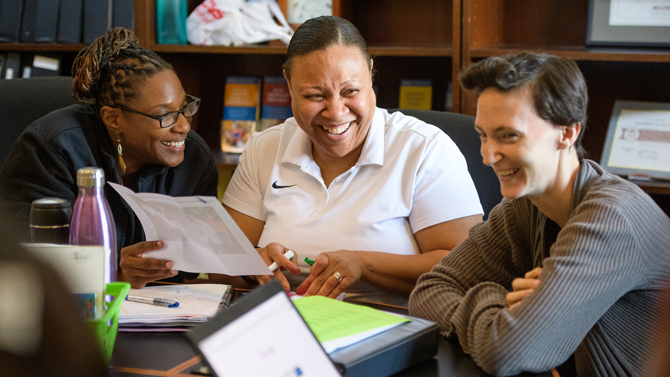


UD summer teacher training takes many forms
Photo by Kathy F. Atkinson August 25, 2017
Mid-career, some professionals decide teaching is their future
On the last Saturday in July, as thousands streamed toward the beach to enjoy one of the summer’s finest days, 20 men and women hunkered down in a classroom at 200 Academy Street on the University of Delaware campus, glued to their chairs for eight hours except for lunch – take-out from Chipotle – and a break here and there.
The teachers-in-training were soaking in the third of six intensive all-day Saturday training sessions as part of the Alternative Routes To Certification (ARTC) Plus program.
They were learning a valuable lesson: Summer is not always a time for elementary and high school teachers to cool their jets. Indeed, many of them were at UD, engaged in training necessary to improve their classroom skills.
By sheer coincidence, the ARTC class boasted the kind of diversity that you couldn’t engineer if you tried. The ages range from 24 to 60, with former chemists and plant genetics experts sitting next to corporate trainers and military human resource personnel. Where else would you find Ant Nyan Peh, a former engineer from Liberia, sharing burritos with Yanan Xu, a native of Northern China who recently received her Ph.D in applied mathematics from Delaware State University?
“They all come from a rich background,” said Frank Livoy, Associate Director for the Delaware Center for Teacher Education. “For some reason, this year we have three candidates born in Africa, one born in El Salvador and two born in China – all of whom are now American citizens. We are very fortunate.”
The ARTC Plus sessions, taught by Livoy, ARTC instructor Jane McFann and Rob Grey, Program Director of the Delaware Transition to Teaching Partnership, were made possible by a state grant designed to train and place math and science teachers in Delaware.
But it was that unplanned diversity that will provide the greatest tool for the trainees as they head out into the world.
“You get a flavor for everything,” said Stacey Kincer, a military brat and ex-Marine who was born in North Carolina and graduated with a degree in Spanish from Old Dominion University. “When you want to talk about incorporating diversity into your thought, and having that diverse voice, we absolutely have it here. And then on top of that they have the same fears and anxieties that you have, so you’re not alone.”
The ARTC Plus program is just one of several UD has hosted this summer.
In June, 11 high school teachers from around the country participated in the National Restaurant Association's ProStart Teachers Workshop. Chef Joe DiGregorio, executive chef and director of education for the UD hospitality department’s food service lab, facilitated the week-long intensive program.
Delaware Sea Grant offers several hands-on professional development programs throughout the summer for K-16 classroom teachers and non-formal educators in various marine science topics and wind energy.
Christopher Petrone, a Marine Advisory Service Agent for the Delaware Sea Grant Program, recently hosted a teacher training program on plankton. He said an important aspect of professional development workshops is built-in time for participants to network and share resources and ideas.
“When possible, workshop participants have close interactions with practicing scientists, practiced educators and industry partners,” Petrone said. “Participants leave the workshops with new or enhanced science content knowledge, useful resources that they can integrate in their curricula, and new experiences and skills to utilize with their students.”
The Delaware Teachers Institute (DTI), a partnership between five New Castle County school districts and UD that is housed in the College of Arts and Sciences, also plays an important role in teacher preparation and improvement over the summer.
Roughly 50 inservice K-12 public school teachers – all DTI Fellows – are actively participating in a 12-session, content-based seminar that began in May and will culminate in January. The seminars range from “Democracy Today,” led by Eric Rise (Sociology and Criminal Justice); to “What Makes the World Around Us?” led by Joel Rosenthal (Biochemistry and Chemistry).
At the conclusion of the first four spring sessions, each DTI Fellow created a reading and research plan for the summer relative to the content they were studying. They spent the last two months researching their topic and refining their idea for a standards-based unit they will write for their classrooms. Each teacher will submit a prospectus outlining their plans to integrate their research into their classroom instruction.
DTI also sent a group of Fellows to New Haven, Conn. from July 9-14 for the Yale National Initiative to strengthen teaching in public schools.
The ARTC Plus program, which Livoy described as a “boot camp for first-year teachers,” has helped many of this year’s candidates shift out of careers that they weren’t happy in so that they could fulfill their life-long dreams of becoming teachers.
“A lot of the community work I’ve been doing has made me realize how much of an impact I want to have,” said Ryan Adams, of Middletown, who already has a job as a secondary English and technology teacher at Odyssey Charter School in Wilmington. “In here, you get tons of different ideas you wouldn’t come up with on your own. You have such varied viewpoints, backgrounds and professional experiences. That’s not something you would get in a normal classroom.”
ARTC has been a fast-paced, information-packed experience, said JoAnn Hernjak, a Hockessin resident who is using the program to achieve certification to teach secondary science.
Like Adams and many of their classmates, Hernjak was looking for a career change.
“It’s comforting to know you’re not the only person who didn’t get it right the first try,” she said. “You have the power to make the choice now and go the way you want to go to be happy.”
Contact Us
Have a UDaily story idea?
Contact us at ocm@udel.edu
Members of the press
Contact us at 302-831-NEWS or visit the Media Relations website

